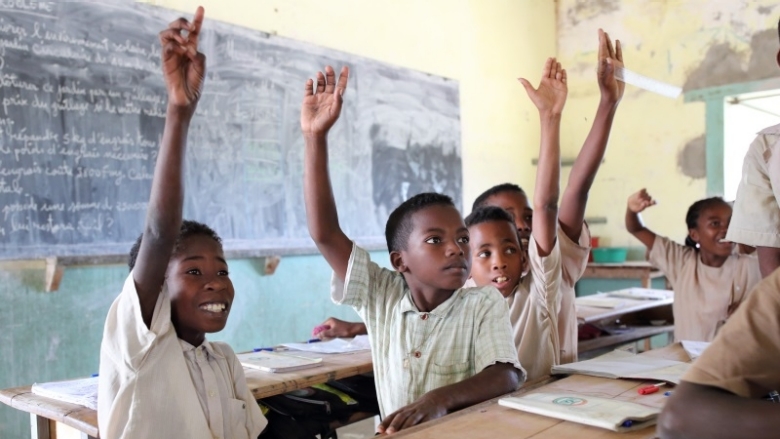Results in Education for All Children (REACH) Trust Fund Call for Proposals – currently open to World Bank staff only
Background
Education is a powerful driver of development and one of the strongest instruments for reducing poverty, raising incomes, promoting economic growth and shared prosperity, and for improving health, gender equality, peace, and stability. It is also central to the development strategies of all WBG clients. With 121 million children not in primary or lower secondary school today and 250 million more not acquiring basic skills necessary for work and life, ending extreme poverty and boosting shared prosperity depend on more and better investments in quality education and learning.
REACH, the World Bank’s trust fund on results-based financing (RBF) in education, aims to support efforts toward more and better education services, especially to those most excluded, by helping country systems focus more sharply on results.
REACH is inviting proposals that seek to scale-up existing RBF mechanisms in education or implement them in new countries or contexts. The call is targeted to World Bank teams that are working with RBF in existing or pipeline activities. It will provide financial support for one year up to $200,000. A total of up to US$1.5 million is available under the Knowledge, Learning, and Innovation (KLI) stream, and will be competitively awarded. For information about REACH please visit our website. For examples of RBF interventions supported by REACH in the past please click here.
Objectives of the Call
The main objective of the call is to improve education outcomes by providing support and documenting the lessons from:
a. Activities that scale up RBF mechanisms that have been shown to strengthen education systems and education outcomes.
b. Adopting/Adapting successful RBF approaches in different countries and contexts (e.g. FCV countries).
The call will also consider small grants for additional analytical work on past RBF impact evaluations that add to the global evidence base.
Activities Supported Under the Call
It is expected that funds will support:
· Analytical and advisory services that provide assistance to scaling up or adapting existing RBF approaches.
· Support for the implementation of scaled up programs that support the use of results-based financing or support the strengthening of related information and monitoring systems.
· Support to strengthen systems to provide information necessary to develop results-based financing mechanisms.
· Additional analytical work on past RBF impact evaluations that add to the global RBF evidence base.
Eligibility Requirements
· This call focuses on basic education including pre-primary, primary and lower secondary education.
· REACH will only consider proposals from World Bank teams that are working with RBF in education in World Bank client countries.
· Proposals must tackle major system challenges (e.g. low levels of learning) in low or middle income countries, and/or fragile or conflict affected countries.
· Proposed activities must start in January 2020 and must be completed by January 31, 2021.
Evaluation Criteria
Successful proposals will:
· Apply, at a larger scale or in a different context, already tested results-based financing (RBF) mechanisms to tackle identified constraints to learning and/or scale-up efforts to ensure that the pre-conditions for RBF are in place
· Focus on under explored areas of the design and implementation of RBF mechanisms in education highlighted in the recent REACH report summarizing existing evidence (available here). For example, proposals that explore complementarities between RBF and other interventions, conditional transfers to students, and proposals that explore in greater detail issues of gaming, cheating and results verification are encouraged
· Explore the use of RBF with:
- Students and families
- School level actors including school principals
- District and central government officials
- Actors involved in the book delivery chain
· Provide evidence of past or current success of the intervention proposed for scale up
· Demonstrate government commitment to activities outlined in the proposal
· Demonstrate clearly how it contributes to the evidence base on RBF
· In case of proposals for additional analytical work on past impact evaluations, provide details on gaps in knowledge and how additional analysis will help fill those gaps and inform the evidence base on RBF
· Identify key knowledge products that will be developed and what they will contribute to the existing evidence base
Proposals to work in FCV countries are strongly encouraged.
REACH grantees that are exploring scaling up previous REACH funded activities are strongly encouraged to apply.
Activity Budgets and Expenditures
The maximum budget for an activity financed through this call for proposals is expected to be $200,000.
Eligible Expenditures
Funds may be used to finance:
· Associated Overheads
· Consultants Fees Individuals with Indirect Costs and Firms
· Contractual Services
· Equipment and Office Premises Lease Cost
· Equipment Purchased
· Extended Term Consultants - with Indirect Costs
· Media, Workshops, Conference and Meeting
· Staff Costs - with Indirect Costs
· Temporary Support Staff Costs - with Indirect Costs
· Travel Expenses
Application Process
Approximately 7-15 applicants will be selected by the REACH Technical Review Committee (and approved by the World Bank management).
Applicants must Complete the Application in Word
Download the application form here.
Email the completed application form (in Word format) to reach@worldbank.org with the subject line: REACH Call for Proposals Application 2020. Applications are due by 6PM EST on December 2, 2019.
Shortlisted applicants may be asked to provide additional information or material to support their application.
Timeline
November 11, 2019 | Application open |
December 2, 2019 | Application deadline |
December 13-20, 2019 | Shortlisted applicants may be contacted to provide additional information |
January 2020 | Notification of award |
January 31, 2021 | Grants and Activities Completed |
Contact
Email: reach@worldbank.org

